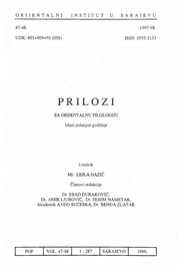O NEKIM MODALNIM ZNAČENJIMA FORME - MIŞ U FINITNIM GLAGOLSKIM OBLICIMA U SA VREMENOM TURSKOM JEZIKU (U POREĐENJU SA BOSANSKIM JEZIKOM)
ON SOME MODAL MEANINGS OF THE - MIŞ FORM OF FINITE VERBAL FORMS IN THE CONTEMPORARY TURKISH LANGUAGE (COMPARED WITH BOSNIAN)
Author(s): Kerima FilanSubject(s): Theoretical Linguistics, Semantics, Comparative Linguistics, South Slavic Languages, Philology, Turkic languages
Published by: Orijentalni Institut u Sarajevu
Keywords: miş form of the finite verb; Contemporary Turkish Language; Bosnian language; Comparative linguistics;
Summary/Abstract: In this paper the examples, phrases or suprasentential units have been analyzed, whose objects contain verbal form -miş as translated from our language into Turkish. Our aim has been, by comparing the Turkish translations with their originals in our language, to find out what makes the translator chose this form of object(s), considering the fact that apart from temporal meaning (which even in some circumstances need not be included) this form also implies certain modal meanings, while in our language modal meanings cannot be expressed by the verb tense itself. The starting point for us in this analysis has been a different position of the narrator who organizes narration in the corpus of texts we have used. It has been shown that, in order to find the equivalent phrase in the target language- by the equivalent phrase we certainly understand the equivalent verb tense by which its object is expressed-besides the meaning of the verb in a phrase being translated, the meaning (or meanings) of the phrase itself must be taken into consideration, i.e.the meaning of the suprasentential unit, within a broader context, and even within the whole text.
Journal: Prilozi za orijentalnu filologiju
- Issue Year: 1995
- Issue No: 42-43
- Page Range: 15-32
- Page Count: 18
- Language: Bosnian

